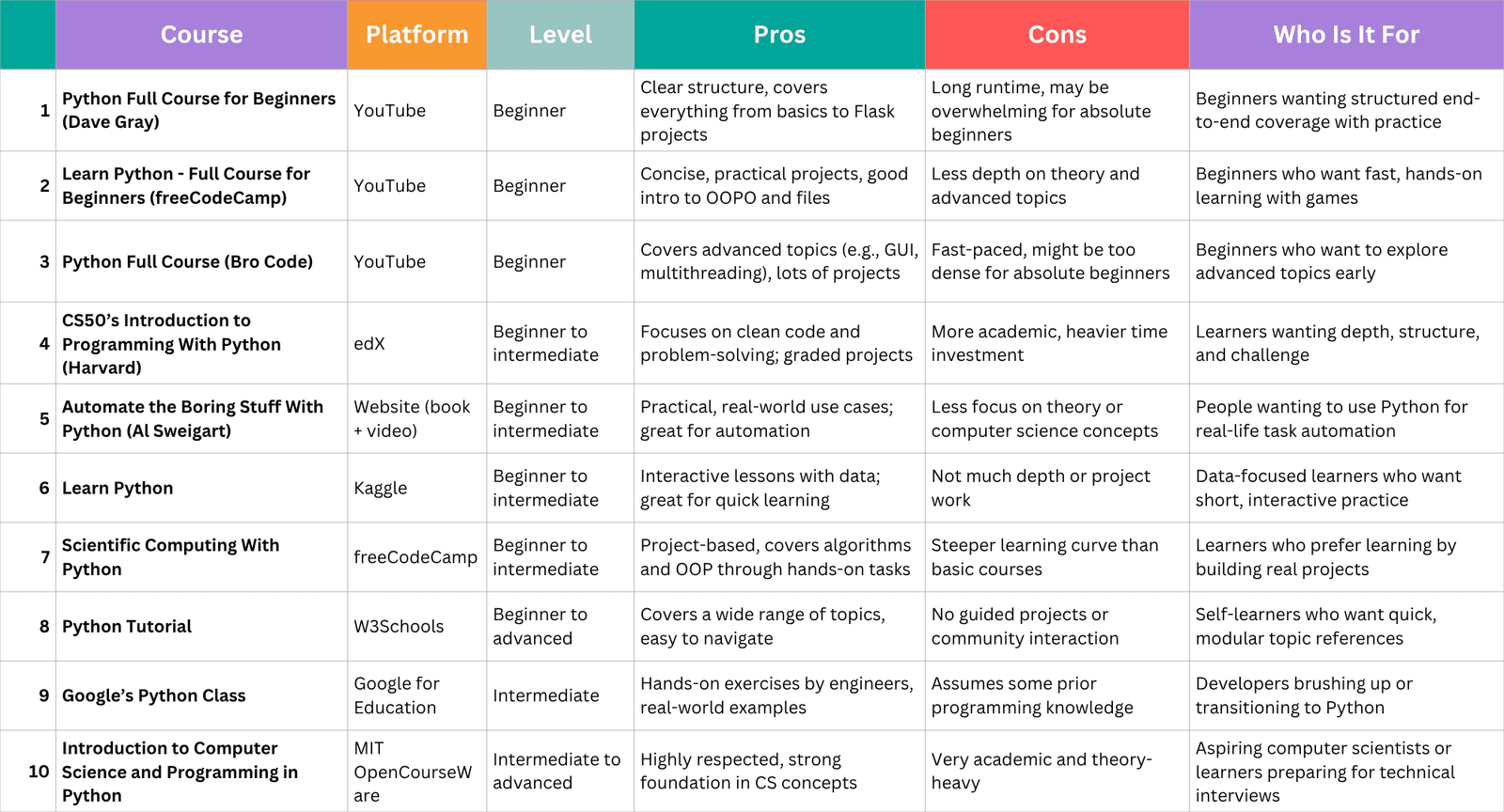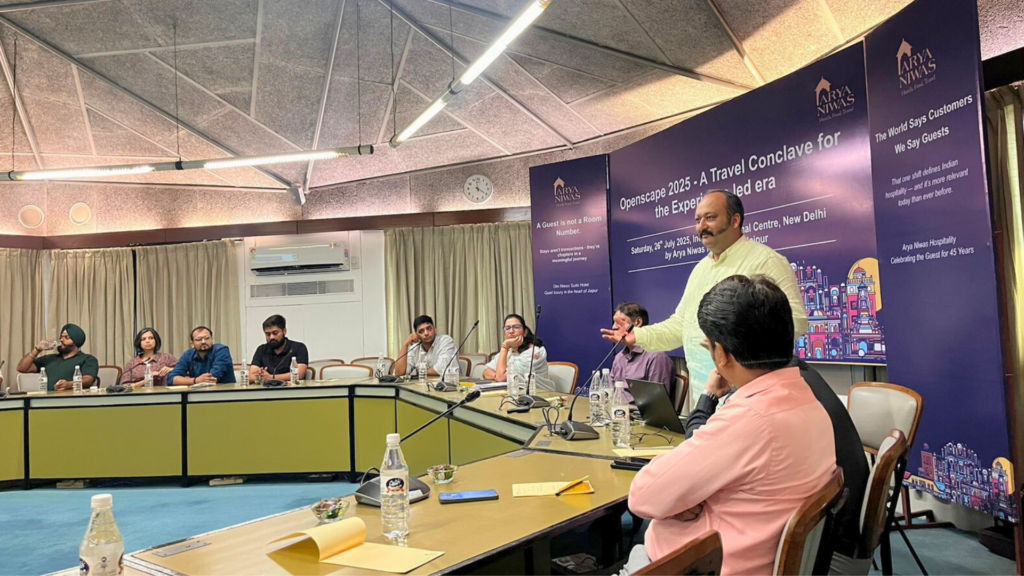AI in Travel
10 Free Online Courses to Master Python in 2025


Image by Author | Canva
It’s not necessary to go into debt if you want to master Python. Many online courses are free. When researching for this article, I was honestly surprised by the quality and the choice of free online Python courses. These are my recommendations.


# 1. Python Full Course for Beginners (Dave Gray)
- Platform: YouTube
- Level: Beginner
- Why Take It: Ideal if you’re starting from zero and want a single video to build a strong foundation.
What You’ll Learn: This course by Dave Gray covers the following topics:
- Core Python syntax and logic: Variables, data types, operators, conditionals, loops, and user input.
- Functions and data: Functions, scope, recursion, lambda functions, and common data structures like lists, dictionaries, tuples, and sets.
- File and module operations: Reading/writing files, using external modules, command-line arguments, and setting up virtual environments.
- Object-oriented programming (OOP): Classes, objects, exceptions, and a mini-project to apply OOP concepts.
- Hands-on coding practice: Challenges throughout the course to reinforce what you learn.
At the end of the video, there’s also a final project for you to complete, where you’ll build a web app in Flask.
# 2. Learn Python – Full Course for Beginners (freeCodeCamp)
- Platform: YouTube
- Level: Beginner
- Why Take It: It’s a 4-hour crash course with no fluff, just straight-to-the-point explanations of essential Python topics for beginners.
What You’ll Learn: This course explains the following concepts:
- Python fundamentals: Variables, data types, strings, numbers, user input, and basic control flow (if, loops, comparisons).
- Data structures and functions: Lists, tuples, dictionaries, functions, return values, and nested structures.
- Projects and games: Build interactive programs like calculators, Mad Libs, guessing games, and quizzes.
- Files, modules, and environment setup: Read/write files, use modules and pip, and work with PyCharm and the Python interpreter.
- Object-oriented programming: Create classes, use methods, apply inheritance, and organize code using OOP.
- Error handling and comments: Write cleaner, more robust code with try/except and inline documentation.
# 3. Python Full Course (Bro Code)
- Platform: YouTube
- Level: Beginner
- Why Take It: Bro Code covers the Python basics in a fast-paced, no-nonsense format. His visual examples and short exercises make it easy to follow.
What You’ll Learn: This course teaches you:
- Core Python programming: Variables, type casting, user input, math operations, string methods, indexing, conditionals, loops, and logical operators.
- Functions and advanced syntax: Function arguments (*args, **kwargs), decorators, list comprehensions, match-case statements, scope resolution, and modules.
- Object-oriented programming: Classes, inheritance (including multiple), polymorphism, static/class methods, magic methods, @property, and duck typing.
- Data structures and control flow: Lists, sets, tuples, dictionaries, 2D collections, iterables, and membership testing.
- Working with files and exceptions: File read/write operations, file detection, exception handling, and working with dates and times.
- Multithreading and APIs: Run concurrent code, interact with APIs, and fetch external data (e.g., weather app).
- GUI development with PyQt5: Learn GUI fundamentals, such as layout managers, widgets (buttons, checkboxes, inputs), styling with CSS, and build interactive desktop apps.
- Projects and real-world practice: Build 15+ mini-projects like calculators, games (Hangman, Rock-Paper-Scissors), encryption tools, banking apps, digital clocks, and more.
# 4. CS50’s Introduction to Programming With Python (Harvard)
- Platform: edX
- Level: Beginner to intermediate
- Why Take It: Emphasizes problem-solving and clean code writing; goes beyond just teaching you syntax.
What You’ll Learn: This Harvard video course covers the following topics:
- Programming fundamentals: Functions, variables, conditionals, loops, and exception handling.
- Working with files and text: File input/output and regular expression basics.
- Modular, testable code: Using libraries and writing unit tests.
- OOP: Learn to use classes and objects to build code.
For each topic, there’s a main lecture video and shorts. You submit a problem set at the end of each lecture, and there’s also a final project to complete.
# 5. Automate the Boring Stuff With Python (Al Sweigart)
- Platform: Automate the Boring Stuff
- Level: Beginner to intermediate
- Why Take It: This book is made available for free by its author. It teaches Python by automating repetitive computer tasks, which makes it practical and immediately applicable to real life.
What You’ll Learn: By reading this book, you’ll learn:
- Core programming skills: Python basics, flow control, loops, functions, debugging, and working with lists, dictionaries, and strings.
- Text and file processing: Regular expressions, file I/O, CSV/JSON/XML, PDF, and Word docs, and text manipulation.
- Automation and scripting: Build command-line tools, schedule tasks, control keyboard/mouse, and interact with web pages and emails.
- Data from external sources: Web scraping, Google Sheets, Excel, and SQLite databases.
- Building interactive programs: Send notifications, generate graphs, process images, use speech engines, and perform OCR (text recognition in images).
# 6. Learn Python
- Platform: Kaggle
- Level: Beginner to intermediate
- Why Take It: Short interactive lessons with real-world data. Especially useful if you’re headed toward data science or machine learning.
What You’ll Learn: This course teaches you the following concepts:
- Python fundamentals: Syntax, variable assignment, number operations, and core data types like lists, strings, and dictionaries.
- Control flow and logic: Booleans, conditionals, loops, and list comprehensions.
- Functions and modular code: Use built-in functions and define your own for reusable, clean code.
- Working with libraries: Import and use external Python libraries to extend your programs.
# 7. Scientific Computing With Python
- Platform: freeCodeCamp
- Level: Beginner to intermediate
- Why Take It: This Python course is part of freeCodeCamp’s core certification path. It’s interactive, browser-based, and involves learning by doing projects.
What You’ll Learn: This comprehensive course consists of the following modules and projects:
- Core programming concepts: Work with strings, numbers, conditionals, and functions through practical projects like ciphers, arithmetic formatters, and time calculators.
- Algorithms and logic building: Apply algorithmic thinking with the Luhn algorithm, bisection method, shortest path, recursion (Tower of Hanoi), and tree traversal.
- Data structures and comprehension: Use lists, list comprehensions, and trees while solving real problems like case conversion and binary search trees.
- Object-oriented programming: Build classes, use encapsulation, special methods, and interfaces in projects like a Sudoku solver, vector space, and equation solver.
- Regular expressions and utilities: Learn regex and utility methods through building tools like a password generator and probability calculator.
# 8. Python Tutorial
- Platform: W3Schools
- Level: Beginner to advanced
- Why Take It: Interactive, fast, and easy to follow, covering a very broad range of Python topics.
What You’ll Learn: This tutorial will walk you through the following concepts:
- Core Python syntax and logic: Variables, data types, operators, conditionals (if, match), loops, functions, lambdas, and scope.
- Data structures and collections: Lists, tuples, sets, dictionaries, arrays, and iterators.
- Object-oriented programming: Classes, inheritance, polymorphism, and modular code design.
- Practical tools and workflows: File handling, string formatting, user input, virtual environments, exception handling, and working with dates, math, JSON, and regular expressions.
- Popular libraries and frameworks: NumPy, pandas, SciPy, Matplotlib, Django, and machine learning basics.
- Databases and backend integration: Interact with MySQL and MongoDB using Python.
- Computer science foundations: Algorithms, data structures, and how they apply in Python.
# 9. Google’s Python Class
- Platform: Google for Education
- Level: Intermediate
- Why Take It: A hands-on course with downloadable lecture notes and exercises created by Google engineers.
What You’ll Learn: This course covers the following topics:
- Core data handling: Strings, lists, tuples, dictionaries, and sorting techniques.
- File and text processing: Reading/writing files and working with regular expressions.
- System and web utilities: Using OS commands, handling URLs/HTTP requests, and managing exceptions.
# 10. Introduction to Computer Science and Programming in Python
- Platform: MIT OpenCourseWare
- Level: Intermediate to advanced
- Why Take It: This is a very highly respected course by three MIT professors. It provides 12 video lessons, lecture slides and code, video solutions, and problem sets.
What You’ll Learn: The course covers the following topics:
- Foundations of computation: Understanding how computers solve problems using logic, branching, and iteration.
- Core programming skills: String manipulation, functions, recursion, lists, tuples, and dictionaries.
- Program design and structure: Decomposition, abstraction, mutability, cloning, and object-oriented programming with classes and inheritance.
- Problem-solving techniques: Approximation, guess-and-check, bisection, searching, and sorting.
- Writing reliable code: Learn testing, debugging, exception handling, assertions, and efficiency analysis.
# Conclusion
With these ten online courses, you’re guaranteed to get high-quality Python knowledge. Luckily, you don’t need money for that — only some time and effort.
Nate Rosidi is a data scientist and in product strategy. He’s also an adjunct professor teaching analytics, and is the founder of StrataScratch, a platform helping data scientists prepare for their interviews with real interview questions from top companies. Nate writes on the latest trends in the career market, gives interview advice, shares data science projects, and covers everything SQL.
AI in Travel
With focus on AI, sustainable travel Arya Niwas organises Openscapes 2025 in New Delhi

The opportunities and challenges that issues like artificial intelligence, sustainability and experiential travel pose to the tourism industry in India and overseas were highlighted at Openscapes 2025, a travel conclave in New Delhi on Saturday.
Organised by Arya Niwas, a hospitality group based in Jaipur, the conclave served as a participative platform to explore transformative ideas for the tourism sector, addressing pressing issues such as sustainability, experiential curation, the role of artificial intelligence (AI), and the integration of responsible practices into the travel experience.
Drawing stakeholders from across India’s hospitality industry, the conclave was organised with the core theme of Projecting India and Rajasthan with a stronger, more meaningful narrative.
“This is the first conclave. It is called Openscapes. We hope that we will be having more such dialogue-based conclaves on travel. There is a need for us to behave as one in the travel industry and to move forward together because the ultimate aim is to serve the guests and make the guests win,” Pooja Bansal, Owner and General Manager, Arya Niwas, told India & You on the sidelines of the event.
The urgency of the issues raised at the meeting was underscored by leading tour operators, who highlighted that Indian tourism, particularly in recent years, “has not been sustainable and things have gone really, really bad.”
The conclave drew stakeholders from across India’s hospitality industry
“When we talk about sustainability with experiential tourism, the experience at the grassroot level, meeting local people with a bit of sustainability, offers eye-opening encounters. Yet, there are challenges,” Navneet Arora, Managing Director, VINString Holidays, a travel agency in New Delhi, told India & You.
The meeting illustrated both obstacles and achievements in rural and urban experiential tourism. Operators cited instances where visitors’ immersion in heritage neighbourhoods and private homes fostered mutual pride among locals and tourists. However, they also warned against approaches that leave rural residents feeling like “monkeys in the zoo,” underscoring the necessity of responsible, respectful interaction, something now addressed by ensuring a share of tour proceeds benefit the communities involved. Sustainability, participants argued, extends well beyond eco-friendly rhetoric.
The conclave highlighted innovative tour formats, slow tourism, creative workshops and direct engagement with artisans, as pathways for deeper, more rewarding guest experiences.
“I think that is the call for the future, because automation has to come in. If we are not doing automation today, we are backwards. AI is important. The event opens up eyes for a lot of people. Difficult, but yes, AI and sustainability are important and doable,” Arora added.
“The interpretation of sustainability has become very cliché. This was a session to break that,” said Bansal.
Participants at the Openscapes 2025 called for a sustained dialogue, with suggestions for sector-wide conventions and targetted sessions on marketing and AI and more collaborative initiatives.
AI in Travel
Sabre Corporation’s Strategic Partnership with Christopherson Business Travel and Its Implications for Undervalued Cloud and AI Stocks

Sabre Corporation (NASDAQ: SABR) has long been a cornerstone of the global travel technology sector, but its recent strategic partnership with Christopherson Business Travel marks a pivotal evolution. By leveraging its AI-driven platform and cloud-native infrastructure, Sabre is not only modernizing corporate travel management but also positioning itself as a catalyst for growth in the undervalued travel tech sector. For investors, this collaboration offers a compelling case study in how AI and cloud innovation can unlock long-term value in a niche yet resilient market.
A Strategic Alliance for the Future of Corporate Travel
On July 17, 2025, Sabre announced a multi-year agreement to become Christopherson Business Travel’s primary technology partner. This partnership is more than a transactional arrangement—it’s a strategic alignment of two companies aiming to redefine corporate travel through automation, real-time data, and personalized service. Sabre’s AI-powered tools, including Sabre Red 360, Trip Proposal, and Market Intelligence, will streamline operations for Christopherson, enabling faster decision-making and enhanced client offerings.
The integration of Sabre’s cloud-native infrastructure into Christopherson’s proprietary Andavo platform is particularly noteworthy. This move allows for real-time orchestration of multi-source content (air, hotel, rail, ground) and seamless API-driven integrations, reducing manual effort and improving scalability. As Chad Maughan, CTO of Christopherson, noted, Sabre’s architecture provides the operational flexibility needed to adapt to evolving client demands—a critical advantage in the post-pandemic corporate travel landscape.
Sabre’s Financial Resilience and AI-Driven Growth
Sabre’s financial performance in 2024 underscores its transition from a turnaround story to a growth-oriented entity. Revenue increased to $3 billion, with adjusted EBITDA rising to $517 million—a 54% year-over-year improvement. While IT Solutions revenue dipped due to de-migrations, the Travel Solutions and Distribution segments grew by 4% and 6%, respectively, driven by demand for Sabre’s AI-powered tools.
The company’s market cap of $1.222 billion pales in comparison to AI/cloud giants like Databricks ($62 billion) or Snowflake ($43.6 billion), but this undervaluation reflects Sabre’s niche focus. Its strategic investments in Sabre Mosaic—a modular platform combining AI, cloud, and traditional agent workflows—position it to capture a larger share of the corporate travel market, which is projected to grow as businesses prioritize cost optimization and efficiency.
The AI/Cloud Travel Tech Opportunity
The broader travel tech sector is undergoing a transformation fueled by generative AI. According to Skift Research, AI-driven tools could create a $28 billion+ opportunity for the industry, with applications in personalized itineraries, dynamic pricing, and automated customer service. Sabre’s Automated Exchanges & Refunds and Agency Retailer solutions are already streamlining post-booking processes, reducing manual intervention by up to 70%.
However, Sabre is not alone in the race to monetize AI in travel. Competitors like C3.ai (NYSE: AI), Marvell Technology (NASDAQ: MRVL), and DigitalOcean (DOCN) are also leveraging cloud and AI to drive growth. C3.ai’s predictive analytics tools, for instance, have secured government contracts worth $450 million, while Marvell’s AI-optimized chips are powering data centers for hyperscale providers. Yet, Sabre’s deep vertical integration into travel-specific workflows gives it a unique edge in the corporate travel niche.
Why Sabre Is an Undervalued Investment
Despite its strategic advantages, Sabre remains overlooked by many investors. Its current price-to-earnings ratio (P/E) of 8.5 is significantly lower than the industry average of 18.5, and its hedge fund ownership (11.2%) suggests growing confidence in its AI-driven roadmap. The partnership with Christopherson is a validation of Sabre’s value proposition: it enables the company to scale its AI/Cloud offerings without overhauling existing systems, a critical factor for travel agencies seeking cost-effective modernization.
For investors, the key question is whether Sabre can replicate its success in other verticals. The company’s PowerSuite Cloud platform, which automates operations and integrates NDC content, is already gaining traction among mid-sized travel agencies. If Sabre can expand its footprint in the corporate and leisure travel markets, its revenue could outpace the 10% growth projected by analysts.
Conclusion: A Strategic Bet on AI-Driven Travel
Sabre’s partnership with Christopherson Business Travel is a microcosm of the broader shift toward AI and cloud-native solutions in travel technology. While the company may lack the valuation of tech giants like Microsoft or Google, its focus on vertical-specific innovation and operational efficiency makes it a compelling play for investors seeking exposure to the travel sector’s AI revolution.
For those considering a diversified portfolio, Sabre offers a unique blend of undervaluation and growth potential. However, it should be viewed as a complementary holding to broader AI/cloud stocks like C3.ai or Marvell, rather than a standalone bet. As the travel industry continues to embrace AI-driven automation, Sabre’s ability to deliver scalable, client-centric solutions will likely drive long-term value for both its partners and shareholders.
AI in Travel
AI Travel Tricks: Watch Out for the Road to Nowhere – Herald/Review Media

AI Travel Tricks: Watch Out for the Road to Nowhere Herald/Review Media
Source link
-

 Brand Stories6 days ago
Brand Stories6 days agoBloom Hotels: A Modern Vision of Hospitality Redefining Travel
-

 Brand Stories22 hours ago
Brand Stories22 hours agoCheQin.ai sets a new standard for hotel booking with its AI capabilities: empowering travellers to bargain, choose the best, and book with clarity.
-

 Destinations & Things To Do7 days ago
Destinations & Things To Do7 days agoUntouched Destinations: Stunning Hidden Gems You Must Visit
-

 AI in Travel7 days ago
AI in Travel7 days agoAI Travel Revolution: Must-Have Guide to the Best Experience
-

 Brand Stories3 weeks ago
Brand Stories3 weeks agoVoice AI Startup ElevenLabs Plans to Add Hubs Around the World
-

 Brand Stories2 weeks ago
Brand Stories2 weeks agoHow Elon Musk’s rogue Grok chatbot became a cautionary AI tale
-

 Asia Travel Pulse3 weeks ago
Asia Travel Pulse3 weeks agoLooking For Adventure In Asia? Here Are 7 Epic Destinations You Need To Experience At Least Once – Zee News
-

 Destinations & Things To Do19 hours ago
Destinations & Things To Do19 hours agoThis Hidden Beach in India Glows at Night-But Only in One Secret Season
-

 AI in Travel3 weeks ago
AI in Travel3 weeks ago‘Will AI take my job?’ A trip to a Beijing fortune-telling bar to see what lies ahead | China
-

 Brand Stories3 weeks ago
Brand Stories3 weeks agoChatGPT — the last of the great romantics

You must be logged in to post a comment Login